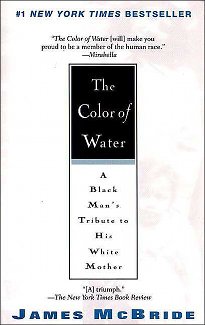Synopsis
In The Color of Water author James McBride writes both his autobiography and a tribute to the life of his mother, Ruth Zylska, a white woman who married Andrew Dennis McBride, a black man from North Carolina. James's childhood was spent in a chaotic household of 12 children who had neither the time nor the outlet to ponder questions of race and identity. Ruth did not want to discuss the painful details of her early life when her abusive father, "Tateh", lorded it over her sweet-tempered and meek mother, "Mameh" ["tateh" and "mameh" are Yiddish terms of endearment for "father" and "mother," roughly equivalent to "daddy and "mommy" [1] ). Ruth had cut all ties with her Jewish family, as they had essentially disowned her when she married James's father.
Born Ruchel Zylska to an Orthodox Jewish family in Poland, Ruth arrived in the United States when she was two years old. [2] She spent her early childhood traveling around the country with her family as her father, Fishel Shilsky, sought employment as a rabbi. Shilsky eventually gave up hope of making a living as a rabbi, settled the family in Suffolk, Virginia, and opened a store in the mostly black section of town, where he overcharged his customers and expressed racist opinions. When Ruth was a child, her father sexually abused her and made harsh demands on her to work constantly in the family store. He also cheated on his wife, in an affair of which practically everyone in town was aware. Ruth's brother Sam left home at age fifteen, and soon after, Ruth too felt she must leave, wanting to escape the oppressive environment of both her family and the South. She was also pregnant by Peter, her black boyfriend in Suffolk, and wanted to deal with the pregnancy away from her family. She trips to New York to stay with relatives, and later moved permanently to Harlem. Ruth's family disowned her when she left, disgusted with her choice of marrying a black man rather than a Jew, her general failure to embrace Judaism, and the defiance of her father. Ruth promised her sister Dee-Dee that she would return to Suffolk, but she could not reconcile her family's desires for her life with her own desires for her life. She betrayed her promise to return for Dee-Dee, and her relationship with her sister suffered as a consequence. This separation from her family recurs throughout the memoir as a painful element in Ruth's life.
In Harlem, Ruth met Dennis, to whom she was immediately attracted. She married him, converted to Christianity, and became very involved with church activities. While the couple experienced a certain degree of prejudice as a result of their interracial marriage, Ruth recalls these years of her life as her happiest ones. Dennis and Ruth opened the New Brown Memorial Church together in memory of Reverend Brown, their favorite preacher. They had several children, and eventually moved to accommodate their growing family. When Ruth was pregnant with Dennis' eighth child, James, Dennis fell ill with lung cancer, and died before their child was born. Ruth mourned his death deeply and became desperate to find a means to support herself and her eight children. She approached her relatives for assistance, but they refused to have any contact with her. Ruth met her second husband, Hunter Jordan, soon after. They married and eventually had four children together.
James weaves his own life story into his mother's story. Ruth's philosophies on race, religion, and work influence him greatly. She always sent her children to the best schools, no matter the commute, to ensure they received the finest possible educations. She demanded respect and hard work from her children, and always treated them tenderly. She had an unwavering faith in God and strong moral convictions. To Ruth, issues of race and identity took secondary importance to moral beliefs. Ruth died at her home in Ewing, New Jersey, on January 9, 2010. [2]
